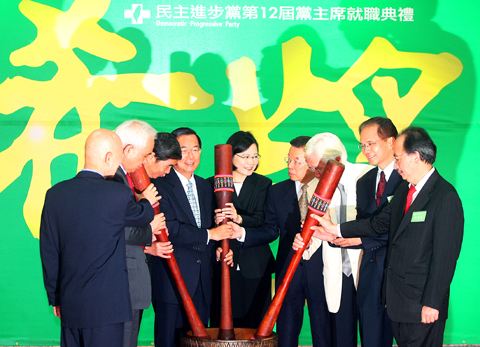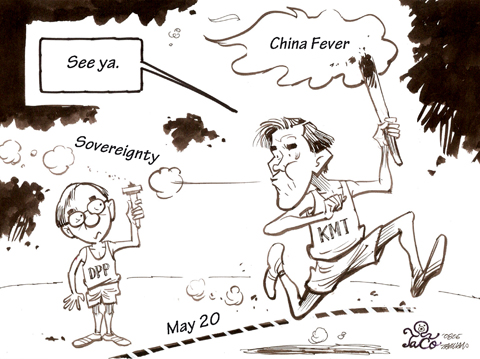New DPP
chief bothered by what Ma did not say
By Loa Iok-sin
STAFF REPORTER
Thursday, May 22, 2008, Page 3
 |
| Flanked by
former president Chen Shui-bian, fourth left, and former Democratic
Progressive Party (DPP) chairmen, Tsai Ing-wen, center, is sworn in as
DPP chairwoman at the party's headquarters in Taipei.
|
Democratic Progressive Party (DPP) Chairwoman Tsai Ing-wen (蔡英文), who was
sworn in yesterday, said that she was concerned that President Ma Ying-jeou
(馬英九) talked a lot about closer cross-strait relations in his inaugural speech
on Tuesday, but made no mention of Taiwan's sovereignty.
“In his entire inaugural speech, Ma didn’t say Taiwan or the Republic of China
is a sovereign state,” Tsai said at her inauguration at DPP headquarters in
Taipei yesterday morning.
“He didn’t even mention that Taiwan’s future should be decided by all Taiwanese
people — something he repeatedly said during his presidential campaign,” Tsai
said.
“It is worrying that the Chinese Nationalist Party [KMT] seems to be overlooking
the issue of Taiwan’s sovereignty,” she said.
Tsai won the chairmanship election on Sunday with more than 73,000 votes —
making her not only the DPP’s first chairwoman but the highest vote-getter in
the party’s history.
Tsai said the DPP would strive to protect Taiwan’s sovereignty while maintaining
the nation’s cultural and ethnic diversity.
“Ma’s inaugural speech made me believe that the DPP will be carrying a heavy
burden,” the chairwoman said.
“We must stand united with other political parties that share our beliefs to
defend Taiwan’s interests, review the party’s accomplishments and mistakes,
further connect ourselves to society, work to deepen Taiwan-oriented values and
defend social justice in the globalized world,” Tsai said. “Then the DPP will
rise again.”
Her predecessor Frank Hsieh (謝長廷) agreed with Tsai and called on all party
members to stand behind her.
Tsai also said that the DPP would develop an economic plan different from that
of the KMT.
“As an opposition party with governing experience, the DPP must come up with a
set of economic strategies to overcome the challenges brought about by
globalization,” she said.
“The DPP’s economic policy will put equal weight on economic growth, social
justice and ecological conservation,” she said.
“We must provide the people with an enjoyable life, high-quality education and a
clean environment — that’s how the DPP will differ from the KMT,” she said.
Tsai got straight down to work yesterday afternoon by presiding over the weekly
Central Standing Committee meeting. She asked the committee members to start
brainstorming on campaign strategies for next year’s county commissioner and
mayoral elections.
“We also touched on improving the party’s ability to deal with policy issues,
talked about setting up a think tank and discussed some legislative bills,” she
told a press conference after the meeting.
|
|
| GRAND HOTEL A Malayan Night Heron is pictured in its nest in Jhongpu Township, Chiayi County, yesterday. The birds have been nesting in a tree near a bed-and-breakfast for the past three years.
|
|
|
| IDOL OR IDOLATRY? A statue of late president Chiang Ching-kuo sits on a shrine at the house of Lai Cheng-sheng, a resident of Yuanshan Township, Ilan County, yesterday. Lai yesterday prepared a huge sacrificial pig for a local religious ceremony, which included the statue.
|

Ma fails
the first test of grace
Thursday, May 22, 2008, Page 8
In his inaugural speech on Tuesday, President Ma Ying-jeou (馬英九) extended an
olive branch to Beijing. While the president talked in some detail about
opportunities for cross-strait reconciliation, he showed little rhetorical
interest in mending the political divide at home.
Ma therefore missed his first opportunity in his capacity as head of state to
deal positively with the bitterness generated by an intense and divisive
presidential race.
Ma’s victory in the March election was decisive, garnering 58.45 percent of the
vote.
But the president could have shown a little more grace by reaching out to that
substantial part of the electorate that rejected his campaign in favor of
Democratic Progressive Party (DPP) Chairman Frank Hsieh (謝長廷) and his running
mate, Su Tseng-chang (蘇貞昌).
His words on Tuesday, instead, were addressed to his supporters.
Referring to the last eight years under the DPP administration, Ma said: “During
that difficult time, faith in politics was low, political maneuvering was high
and economic security was absent.”
These were hardly the words of a statesman looking to broaden his appeal. And
the whiff of hyperbole they contained will not make Ma look very credible when
the complexity of Taiwan’s economic circumstances hits home in the coming
months.
On his election victory, Ma said: “The people have chosen clean politics, an
open economy, ethnic harmony and peaceful cross-strait relations in opening
their arms to the future.”
These statements will not diminish the skepticism of the millions of people who
did not vote for him. They were words delivered by Ma the presidential
candidate, not Ma the leader of a country.
The degree of Ma’s criticism of the previous administration was imprudent at a
ceremony that could have been a celebration of the democratic process that
installed him and of the transition from the tensions of election season.
Ma must now speak as the voice of Taiwan, bridging the partisan gap whenever
possible, and not merely parrot belligerent voices in the pan-blue camp, as he
has grown accustomed to doing.
It was not so long ago that pundits and politicians attacked former president
Chen Shui-bian (陳水扁) for failing to act as a president for all, despite
proclaiming himself to be “the people’s president.” How rapidly their tune has
changed with the recovery of executive power.
Garnering support across the political spectrum is not just about fortifying
one’s political base. A major task facing Ma and his administration in the first
year will be to mitigate the partisan divide that has proven so obstructive in
producing legislation of substance.
Ma’s words on Tuesday may not have been a move in that direction, but the new
president and his Cabinet still have time over the next few weeks to set a more
positive tone in the way they conduct their affairs. The DPP is a minority
party, but its support base is considerable; an executive that runs roughshod
over the differing sensibilities of those supporters would find the going harder
than expected.
DPP must
pursue a unified vision
By Tseng Kuei-hi,Bob
Kuo 曾貴海、郭峰淵
Thursday, May 22, 2008, Page 8
Companies with vision are not only stable, long-lasting firms but also widely
respected.
Such organizations have an enormous impact on the world. The 2004 bestseller
Built to Last: Successful Habits of Visionary Companies, written by James
Collins and Jerry Porras, says that the key to success lies in building and
maintaining core ideologies.
The 18 visionary companies in the book all share certain characteristics. The
first of these is transcendence. These companies transcend the restrictions of
their structure and of words, as well as themselves, and they are always
prepared for constantly changing challenges. In other words, a fundamental part
of their ideology is that they have to keep challenging themselves.
Visionary companies never think that they are doing well enough. They
continually ask themselves: How can I improve, so as to do even better tomorrow?
In addition, success and defeating the competition are not their driving goals.
Second, almost all of them devoutly follow their core ideologies, and teach
their employees to preserve them, creating an atmosphere and identity specific
to a company that is somewhat cult-like. What really matters is not what a
company’s ideology is, but whether its strategies are in line with those values.
These companies do not just ask what they should covet and pursue without the
guidance of their core values.
Third, their core ideologies are based on harmony. They don’t see things in
black and white, which would be detrimental to internal unity. On the contrary,
they pursue co-existence and integration for the sake of stability and progress
and promote their company identity while respecting their employees as
individuals.
If we look at the Democratic Progressive Party’s (DPP) incoming chairwoman, Tsai
Ing-wen (蔡英文), and former senior presidential adviser Koo Kwang-ming (辜寬敏), whom
she defeated in the party election, it is not difficult to see that Tsai aims
for transcendence and hopes to realize Taiwanese autonomy through innovative
ways. Koo, on the other hand, would have sought to strengthen the DPP’s unique
atmosphere and beat the Chinese Nationalist Party (KMT) by bolstering his
party’s pro-localization identity.
As for harmony, the whole DPP has failed to pursue a platform based on that
ideal. In its eight years at the helm of the Executive Yuan, the party failed to
transcend its pro-Taiwan independence agenda through innovation, while DPP
“dummy members” discredited its identity and shifted the party toward
aggression. When the party wasn’t busy scaring off moderate voters with the same
old pro-independence credo, it was busy staging conflict in the name of
localization. These are the reasons that the party suffered crushing defeats in
the legislative and presidential elections.
As German sociologist Jurgen Habermas observed, the present is the past that is
on its way to the future. From a visionary perspective, the characteristics of
transcendence, a cult-like, unique identity and non-aggressive policies can
integrate the past, the present and the future. However, over the past eight
years, the DPP has repeatedly adjusted its ideology and policies, which has had
negative repercussions for the independence agenda.
Being visionary means seeing the past not as a shameful history to bury in the
archives. Instead, the DPP must pursue transcendence by reforming itself and
becoming visionaries who will make Taiwan a nation of knowledge in the 21st
century.
Tseng Kuei-hi is a doctor; Bob Kuo is a
professor in the Department of Information Management at National Sun Yat-sen
University.
Chinese cop
helps quake effort — by breastfeeding
Thursday, May 22, 2008,Page 14
|
|
|
A woman affected by Cyclone Nargis breastfeeds her child on the outskirts of Yangon, Myanmar, on May 17, 2008. The cyclone hit Myanmar on May 2 and has led to the deaths of tens of thousands of people. PHOTO: AFP |
A Chinese policewoman is contributing to the country’s earthquake relief effort
in a very personal way. She’s breastfeeding eight babies!
A newspaper in Chengdu, the capital of quake-hit Sichuan Province, devoted a
special page to the 29-year-old woman. The newspaper called her a “hero.”
The woman from the quake-ravaged town of Jiangyou has just had a child herself,
the Western Urban Daily said.
She is nursing the children of three women who were left homeless by the quake.
Those women are extremely sad and are unable to give milk. She’s also
breastfeeding five orphans, the report said.
The babies who lost their parents have been put in an orphanage which does not
have powdered milk, it said.
Over 40,000 people were killed in the May 12 earthquake. It’s China’s worst
natural disaster in a generation.(STAFF WRITER, WITH AFP)